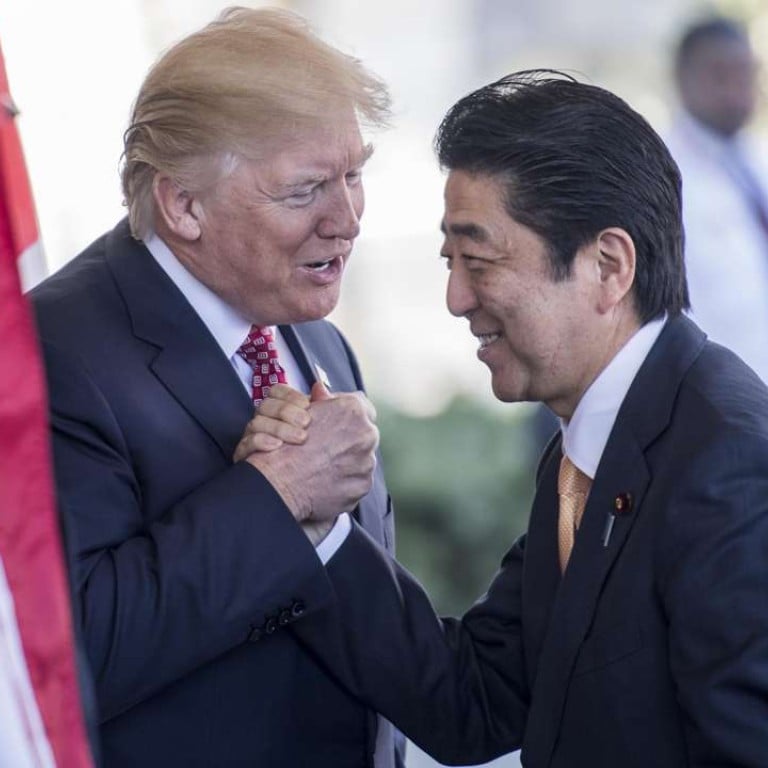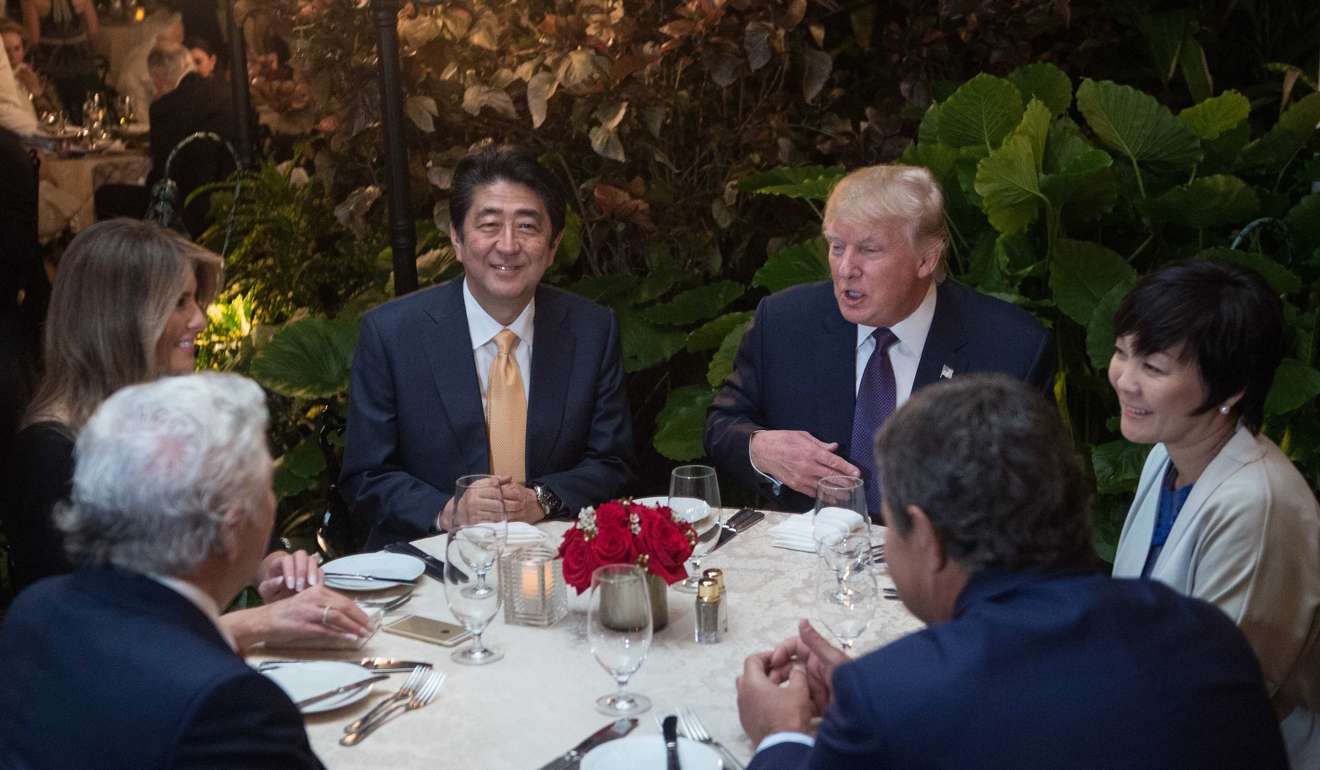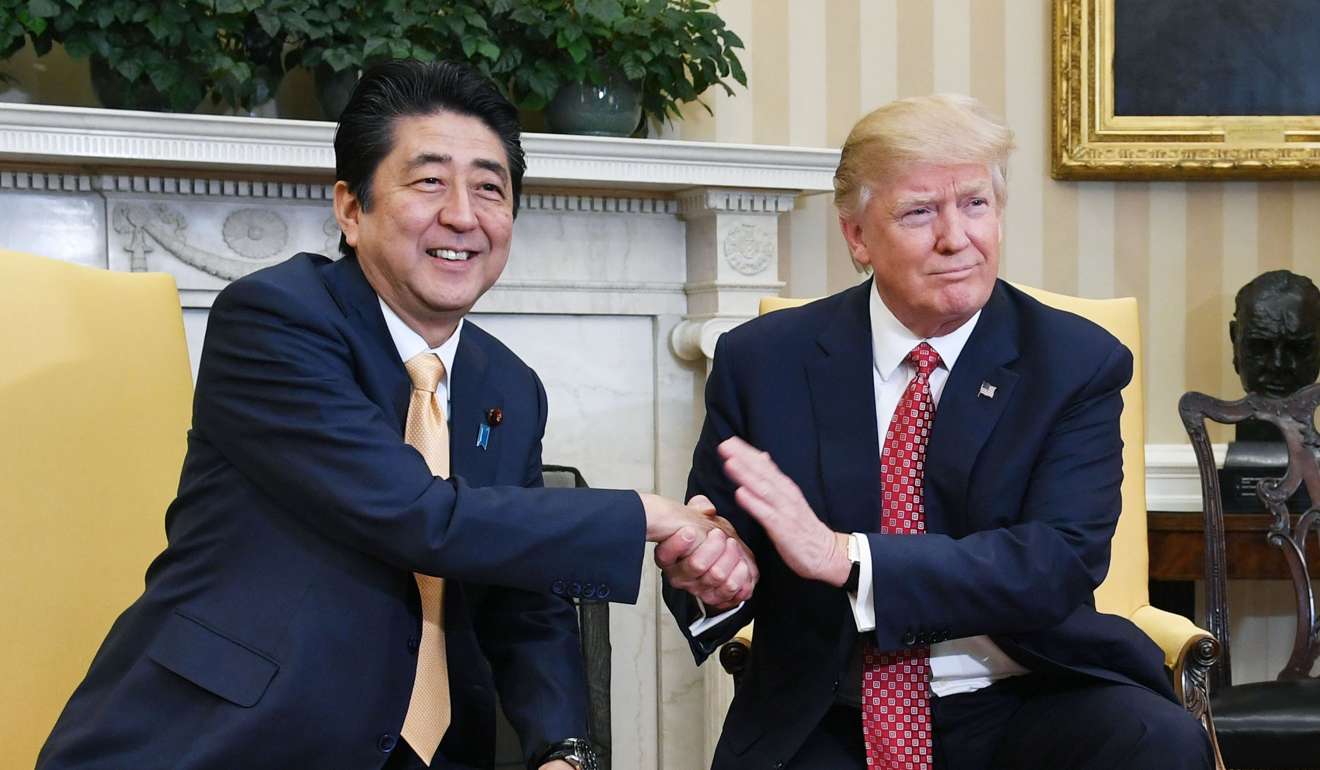
Bilateral trade talks with Trump could prove costly for Abe at home
Leaders could begin talks on two-way trade deal, undermining Abe’s promises to Japanese businesses that expanded export opportunities would be created under now-defunct TPP
The leaders of Japan and the US spoke positively of their decision on Friday to set up a dialogue on bilateral trade, but forthcoming negotiations may cost Japanese Prime Minister Shinzo Abe political capital at home.
Stopping short of declaring the start of bilateral free trade agreement negotiations, Abe and US President Donald Trump agreed to establish a “bilateral dialogue framework” helmed by Japanese Deputy Prime Minister Taro Aso – who doubles as finance minister – and US Vice-President Mike Pence.
Under the banner of his “America First” agenda, Trump pulled the US out of the 12-party Trans-Pacific Partnership (TPP) trade agreement shortly after taking office on January 20. With its largest signatory by gross domestic product gone, the TPP cannot come into force under its current terms.
That was galling news to Abe, who expended a great deal of effort to convince key agricultural and industry lobbies to agree to the TPP’s wide-ranging tariff cuts in exchange for the promise of enhanced export opportunities.
“Both Japan and the United States have a great chance to expand free trade and investment in the Asia-Pacific region, which is achieving ever more rapid growth,” Abe said at Friday’s press conference. “But that must be done in a fair manner.”

To maintain support from Japanese voters, [Abe] has to promote economic growth and protect Japanese interests
Takumi Sakuyama, a former Japanese government TPP negotiator who is now an associate professor of agriculture at Tokyo’s Meiji University, said it is “risky” but “inevitable” for the Abe administration to respond to a US request to start negotiations toward a bilateral trade deal.
“Bilateral discussions are going to give an advantage to the larger economy – the United States – and Mr Trump’s record of complaints about Japan’s automotive trade, beef tariffs and currency manipulation indicates he will ... drive a hard bargain,” he said.
While a Japanese government official quoted Abe and Trump as agreeing at a working lunch on Friday that the Japan-US trade friction of the 1980s is “a thing of the distant past”, Japanese negotiators may find Trump’s fairly consistent “America First” creed gives them little wiggle room.
Trump has taken issue with the size of the US trade deficit with Japan and called for the country to knock down non-tariff barriers to US auto imports, scoring points with supporters.
In agriculture, US beef and pork farmers’ lobbies have urged Trump to pursue a bilateral deal with Japan to compete with Australia, which enjoys lower tariffs on its beef exports to Japan under an economic partnership agreement.

Trump told a rally during his election campaign he will deal with Japanese tariffs on US beef, quoted by US media as saying: “I will take care of that situation so fast. In one day that situation will be equalised.”
Abe, meanwhile, is tasked with finding the best time to dissolve the House of Representatives for an election. Mixed results at a much-hyped summit with Russian President Vladimir Putin in Japan in December are thought to have dissuaded Abe from dissolving the chamber last month.
“To maintain support from Japanese voters, [Abe] has to promote economic growth and protect Japanese interests including those of its big automakers,” said Rich Ellings, president of the National Bureau of Asian Research, a non-partisan US-Asia policy think tank based in Washington.
“Japan has a very difficult time truly reforming domestically and opening up its market fully – that’s why the negotiations in the TPP included some remarkable things, unprecedented for Japan.”
It is still in Japan’s strategic interest to keep alluding to the need to keep the ideas behind the TPP alive, said Geoffrey Gertz, a post-doctoral fellow at the Brookings Institution in Washington.

Some of the pact’s smaller signatories have suggested changing the deal’s terms so it can go into force without the US. A joint statement released by Abe and Trump after the summit said Japan will continue to “advance regional progress on the basis of existing initiatives”, hinting at Japan pursuing an 11-party TPP.
With bilateral trade negotiations between major economies tending to take years, Abe may end up allowing the start of talks toward a Japan-US pact while hoping to not be around to see it concluded, Sakuyama said.
Abe’s Liberal Democratic Party is expected to change its rules next month to extend term limits on party presidents, meaning he could remain prime minister through 2020.
“My expectation is that the negotiations will not finish before Mr. Trump’s second term or before Mr. Abe’s term expires ... and [Abe] will be able to keep promising Japanese farmers he will protect tariffs on rice and other key farm products.” Sakuyama said.
But even if Abe can dodge the political expense of concluding a bilateral deal, the bottom lines of the major Japanese exporters who fuel his growth strategy are still vulnerable to Trump’s promised renegotiation of the North American Free Trade Agreement, which Abe “can do nothing about”, Sakuyama said.

